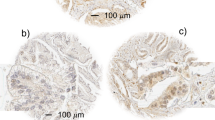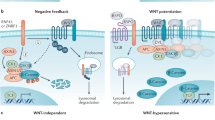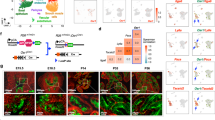Abstract
The Wnt signalling pathway plays a role in the direction of embryological development and maintenance of stem cell populations. Heritable alterations in genes encoding molecules of the Wnt pathway, including mutation and epigenetic events, have been demonstrated in a variety of cancers. It has been proposed that disruption of this pathway is a significant step in the development of many tumours. Interactions between β-catenin—the effector molecule of the Wnt pathway—and the androgen receptor highlight the pathway's relevance to urological malignancy. Mutation or altered expression of Wnt genes in tumours may give prognostic information and treatments are being developed which target this pathway.
This is a preview of subscription content, access via your institution
Access options
Subscribe to this journal
Receive 4 print issues and online access
$259.00 per year
only $64.75 per issue
Buy this article
- Purchase on Springer Link
- Instant access to full article PDF
Prices may be subject to local taxes which are calculated during checkout


Similar content being viewed by others
References
Wodarz A, Nusse R . Mechanisms of Wnt signaling in development. Annu Rev Cell Dev Biol 1998; 14: 59–88.
Yang-Snyder J et al. A frizzled homolog functions in a vertebrate Wnt signaling pathway. Curr Biol 1996; 6: 1302–1306.
Noordermeer J, Klingensmith J, Perrimon N, Nusse R . Dishevelled and armadillo act in the wingless signalling pathway in Drosophila. Nature 1994; 367: 80–83.
Fagotto F et al. Domains of axin involved in protein-protein interactions, Wnt pathway inhibition, and intracellular localization. J Cell Biol 1999; 145: 741–756.
Willert K, Shibamoto S, Nusse R . Wnt-induced dephosphorylation of axin releases beta-catenin from the axin complex. Genes Dev 1999; 13: 1768–1773.
Bodmer WF et al. Localization of the gene for familial adenomatous polyposis on chromosome 5. Nature 1987; 328: 614–616.
Trent JM et al. The gene for the APC-binding protein beta-catenin (CTNNB1) maps to chromosome 3p22, a region frequently altered in human malignancies. Cytogenet Cell Genet 1995; 71: 343–344.
Ikeda S et al. GSK-3beta-dependent phosphorylation of adenomatous polyposis coli gene product can be modulated by beta-catenin and protein phosphatase 2A complexed with Axin. Oncogene 2000; 19: 537–545.
Ikeda S et al. Axin, a negative regulator of the Wnt signaling pathway, forms a complex with GSK-3beta and beta-catenin and promotes GSK-3 beta-dependent phosphorylation of beta-catenin. EMBO J 1998; 17: 1371–1384.
Chesire DR, Isaacs WB . Beta-catenin signaling in prostate cancer: an early perspective. Endocrine Related Cancer 2003; 10: 537–560.
Dajani R et al. Structural basis for recruitment of glycogen synthase kinase 3beta to the axin-APC scaffold complex. EMBO J 2003; 22: 494–501.
Fearnhead NS, Britton MP, Bodmer WF . The ABC of APC. Hum Mol Genet 2001; 10: 721–733.
Lee E et al. The roles of APC and axin derived from experimental and theoretical analysis of the Wnt pathway. PLoS Biol 2003; 1: E10.
Dong X et al. Genomic structure, chromosome mapping and expression analysis of the human AXIN2 gene. Cytogenet Cell Genet 2001; 93: 26–28.
Behrens J et al. Functional interaction of an axin homolog, conductin, with beta-catenin, APC, and GSK3beta. Science 1998; 280: 596–599.
Kobayashi M et al. Nuclear translocation of beta-catenin in colorectal cancer. Br J Cancer 2000; 82: 1689–1693.
Roose J, Clevers H . TCF transcription factors: molecular switches in carcinogenesis. Biochim Biophys Acta 1999; 1424: M23–M37.
He TC et al. Identification of c-MYC as a target of the APC pathway. Science 1998; 281: 1509–1512.
Mann B et al. Target genes of beta-catenin-T cell-factor/lymphoid-enhancer-factor signaling in human colorectal carcinomas. Proc Natl Acad Sci USA 1999; 96: 1603–1608.
Crawford HC et al. The metalloproteinase matrilysin is a target of beta-catenin transactivation in intestinal tumors. Oncogene 1999; 18: 2883–2891.
Marchenko ND et al. Beta-catenin regulates the gene of MMP-26, a novel metalloproteinase expressed both in carcinomas and normal epithelial cells. Int J Biochem Cell Biol 2004; 36: 942–956.
Tetsu O, McCormick F . Beta-catenin regulates expression of cyclin D1 in colon carcinoma cells. Nature 1999; 398: 422–426.
Wiechens N et al. Nucleo-cytoplasmic shuttling of Axin, a negative regulator of the Wnt-beta-catenin Pathway. J Biol Chem 2004; 279: 5263–5267.
Cong F, Varmus H . Nuclear-cytoplasmic shuttling of Axin regulates subcellular localization of {beta}-catenin. Proc Natl Acad Sci USA 2004; 101: 2882–2887.
Leung JY et al. Activation of AXIN2 expression by beta-catenin-T cell factor. A feedback repressor pathway regulating Wnt signaling. J Biol Chem 2002; 277: 21657–21665.
Lustig B et al. Negative feedback loop of Wnt signaling through upregulation of conductin/axin2 in colorectal and liver tumors. Mol Cell Biol 2002; 22: 1184–1193.
Playford MP et al. Insulin-like growth factor 1 regulates the location, stability, and transcriptional activity of beta-catenin. Proc Natl Acad Sci USA 2000; 97: 12103–12108.
Desbois-Mouthon C et al. Insulin and IGF-1 stimulate the beta-catenin pathway through two signalling cascades involving GSK-3beta inhibition and Ras activation. Oncogene 2001; 20: 252–259.
Monick MM et al. Ceramide regulates lipopolysaccharide-induced phosphatidylinositol 3-kinase and Akt activity in human alveolar macrophages. J Immunol 2001; 167: 5977–5985.
Matsuzawa SI, Reed JC . Siah-1, SIP, and Ebi collaborate in a novel pathway for beta-catenin degradation linked to p53 responses. Mol Cell 2001; 7: 915–926.
Liu J et al. Siah-1 mediates a novel beta-catenin degradation pathway linking p53 to the adenomatous polyposis coli protein. Mol Cell 2001; 7: 927–936.
Iwai A et al. Siah-1L, a novel transcript variant belonging to the human Siah family of proteins, regulates beta-catenin activity in a p53-dependent manner. Oncogene 2004; 23: 7593–7600.
Deng J et al. Beta-catenin interacts with and inhibits NF-kappa B in human colon and breast cancer. Cancer Cell 2002; 2: 323–334.
Deng J et al. Crossregulation of NF-kappaB by the APC/GSK-3beta/beta-catenin pathway. Mol Carcinog 2004; 39: 139–146.
Nastasi T et al. Ozz-E3, a muscle-specific ubiquitin ligase, regulates beta-catenin degradation during myogenesis. Dev Cell 2004; 6: 269–282.
Seeling JM et al. Regulation of beta-catenin signaling by the B56 subunit of protein phosphatase 2A. Science 1999; 283: 2089–2091.
Hsu W, Zeng L, Costantini F . Identification of a domain of Axin that binds to the serine/threonine protein phosphatase 2A and a self-binding domain. J Biol Chem 1999; 274: 3439–3445.
Easwaran V, Pishvaian M, Salimuddin, Byers S . Cross-regulation of beta-catenin-LEF/TCF and retinoid signaling pathways. Curr Biol 1999; 9: 1415–1418.
Tice DA et al. Synergistic induction of tumor antigens by Wnt-1 signaling and retinoic acid revealed by gene expression profiling. J Biol Chem 2002; 277: 14329–14335.
Liu T, Lee YN, Malbon CC, Wang HY . Activation of the beta-catenin/Lef-Tcf pathway is obligate for formation of primitive endoderm by mouse F9 totipotent teratocarcinoma cells in response to retinoic acid. J Biol Chem 2002; 277: 30887–30891.
Xiao JH et al. Adenomatous polyposis coli (APC)-independent regulation of beta-catenin degradation via a retinoid X receptor-mediated pathway. J Biol Chem 2003; 278: 29954–29962.
Rother K et al. Identification of Tcf-4 as a transcriptional target of p53 signalling. Oncogene 2004; 23: 3376–3384.
Levina E, Oren M, Ben-Ze'ev A . Downregulation of beta-catenin by p53 involves changes in the rate of beta-catenin phosphorylation and Axin dynamics. Oncogene 2004; 23: 4444–4453.
Oloumi A, McPhee T, Dedhar S . Regulation of E-cadherin expression and beta-catenin/Tcf transcriptional activity by the integrin-linked kinase. Biochim Biophys Acta 2004; 1691: 1–15.
Park CS et al. Modulation of beta-catenin phosphorylation/degradation by cyclin-dependent kinase 2. J Biol Chem 2004; 279: 19592–19599.
Kim SI et al. Cyclin-dependent kinase 2 regulates the interaction of Axin with beta-catenin. Biochem Biophys Res Commun 2004; 317: 478–483.
Morin PJ et al. Activation of beta-catenin-Tcf signaling in colon cancer by mutations in beta-catenin or APC. Science 1997; 275: 1787–1790.
Powell SM et al. APC mutations occur early during colorectal tumorigenesis. Nature 1992; 359: 235–237.
Asman HB, Pierce ER . Familial multiple polyposis. A statistical study of a large Kentucky kindred. Cancer 1970; 25: 972–981.
Korinek V et al. Constitutive transcriptional activation by a beta-catenin-Tcf complex in APC−/− colon carcinoma. Science 1997; 275: 1784–1787.
Sparks AB, Morin PJ, Vogelstein B, Kinzler KW . Mutational analysis of the APC/beta-catenin/Tcf pathway in colorectal cancer. Cancer Res 1998; 58: 1130–1134.
Ilyas M et al. Beta-catenin mutations in cell lines established from human colorectal cancers. Proc Natl Acad Sci USA 1997; 94: 10330–10334.
Fukuchi T et al. Beta-catenin mutation in carcinoma of the uterine endometrium. Cancer Res 1998; 58: 3526–3528.
Palacios J, Gamallo C . Mutations in the beta-catenin gene (CTNNB1) in endometrioid ovarian carcinomas. Cancer Res 1998; 58: 1344–1347.
Park WS et al. Frequent somatic mutations of the beta-catenin gene in intestinal-type gastric cancer. Cancer Res 1999; 59: 4257–4260.
Miyoshi Y et al. Activation of the beta-catenin gene in primary hepatocellular carcinomas by somatic alterations involving exon 3. Cancer Res 1998; 58: 2524–2527.
Sunaga N et al. Constitutive activation of the Wnt signaling pathway by CTNNB1 (beta-catenin) mutations in a subset of human lung adenocarcinoma. Genes Chromosomes Cancer 2001; 30: 316–321.
Rubinfeld B et al. Stabilization of beta-catenin by genetic defects in melanoma cell lines. Science 1997; 275: 1790–1792.
Rimm DL et al. Frequent nuclear/cytoplasmic localization of beta-catenin without exon 3 mutations in malignant melanoma. Am J Pathol 1999; 154: 325–329.
Satoh S et al. AXIN1 mutations in hepatocellular carcinomas, and growth suppression in cancer cells by virus-mediated transfer of AXIN1. Nat Genet 2000; 24: 245–250.
Taniguchi K et al. Mutational spectrum of beta-catenin, AXIN1, and AXIN2 in hepatocellular carcinomas and hepatoblastomas. Oncogene 2002; 21: 4863–4871.
Koppert LB et al. Frequent loss of the AXIN1 locus but absence of AXIN1 gene mutations in adenocarcinomas of the gastro-oesophageal junction with nuclear beta-catenin expression. Br J Cancer 2004; 90: 892–899.
Dahmen RP et al. Deletions of AXIN1, a component of the WNT/wingless pathway, in sporadic medulloblastomas. Cancer Res 2001; 61: 7039–7043.
Baeza N, Masuoka J, Kleihues P, Ohgaki H . AXIN1 mutations but not deletions in cerebellar medulloblastomas. Oncogene 2003; 22: 632–636.
Liu W et al. Mutations in AXIN2 cause colorectal cancer with defective mismatch repair by activating beta-catenin/TCF signalling. Nat Genet 2000; 26: 146–147.
Wu R, Zhai Y, Fearon ER, Cho KR . Diverse mechanisms of beta-catenin deregulation in ovarian endometrioid adenocarcinomas. Cancer Res 2001; 61: 8247–8255.
Watcharasit P et al. Direct, activating interaction between glycogen synthase kinase-3beta and p53 after DNA damage. Proc Natl Acad Sci USA 2002; 99: 7951–7955.
Kim HS et al. Regulation of angiogenesis by glycogen synthase kinase-3beta. J Biol Chem 2002; 277: 41888–41896.
Brewster SF, Browne S, Brown KW . Somatic allelic loss at the DCC, APC, nm23-H1 and p53 tumor suppressor gene loci in human prostatic carcinoma. J Urol 1994; 151: 1073–1077.
Phillips SM et al. Loss of heterozygosity of the retinoblastoma and adenomatous polyposis susceptibility gene loci and in chromosomes 10p, 10q and 16q in human prostate cancer. Br J Urol 1994; 73: 390–395.
Watanabe M et al. APC gene mutations in human prostate cancer. Jpn J Clin Oncol 1996; 26: 77–81.
Suzuki H et al. State of adenomatous polyposis coli gene and ras oncogenes in Japanese prostate cancer. Jpn J Cancer Res 1994; 85: 847–852.
Davies G, Jiang WG, Mason MD . Cell–cell adhesion molecules and signaling intermediates and their role in the invasive potential of prostate cancer cells. J Urol 2000; 163: 985–992.
Bryden AA et al. E-cadherin and beta-catenin are down-regulated in prostatic bone metastases. Br J Urol Int 2002; 89: 400–403.
Voeller HJ, Truica CI, Gelmann EP . Beta-catenin mutations in human prostate cancer. Cancer Res 1998; 58: 2520–2523.
Gerstein AV et al. APC/CTNNB1 (beta-catenin) pathway alterations in human prostate cancers. Genes Chromosomes Cancer 2002; 34: 9–16.
Chesire DR et al. Detection and analysis of beta-catenin mutations in prostate cancer. Prostate 2000; 45: 323–334.
Chesire DR, Ewing CM, Gage WR, Isaacs WB . In vitro evidence for complex modes of nuclear beta-catenin signaling during prostate growth and tumorigenesis. Oncogene 2002; 21: 2679–2694.
de la Taille A et al. Beta-catenin-related anomalies in apoptosis-resistant and hormone-refractory prostate cancer cells. Clin Cancer Res 2003; 9: 1801–1807.
Chen G et al. Up-regulation of Wnt-1 and beta-catenin production in patients with advanced metastatic prostate carcinoma: potential pathogenetic and prognostic implications. Cancer 2004; 101: 1345–1356.
Gounari F et al. Stabilization of beta-catenin induces lesions reminiscent of prostatic intraepithelial neoplasia, but terminal squamous transdifferentiation of other secretory epithelia. Oncogene 2002; 21: 4099–4107.
Culig Z et al. Expression, structure, and function of androgen receptor in advanced prostatic carcinoma. Prostate 1998; 35: 63–70.
Truica CI, Byers S, Gelmann EP . Beta-catenin affects androgen receptor transcriptional activity and ligand specificity. Cancer Res 2000; 60: 4709–4713.
Yang F et al. Linking beta-catenin to androgen-signaling pathway. J Biol Chem 2002; 277: 11336–11344.
Pawlowski JE et al. Liganded androgen receptor interaction with beta-catenin: nuclear co-localization and modulation of transcriptional activity in neuronal cells. J Biol Chem 2002; 277: 20702–20710.
Mulholland DJ et al. The androgen receptor can promote beta-catenin nuclear translocation independently of adenomatous polyposis coli. J Biol Chem 2002; 277: 17933–17943.
Chesire DR, Isaacs WB . Ligand-dependent inhibition of beta-catenin/TCF signaling by androgen receptor. T cell factor. Oncogene 2002; 21: 8453–8469.
Mulholland DJ et al. Functional localization and competition between the androgen receptor and T-cell factor for nuclear beta-catenin: a means for inhibition of the Tcf signaling axis. Oncogene 2003; 22: 5602–5613.
Linja MJ et al. Expression of androgen receptor coregulators in prostate cancer. Clin Cancer Res 2004; 10: 1032–1040.
Li P, Nicosia SV, Bai W . Antagonism between PTEN/MMAC1/TEP-1 and androgen receptor in growth and apoptosis of prostatic cancer cells. J Biol Chem 2001; 276: 20444–20450.
Wen Y et al. HER-2/neu promotes androgen-independent survival and growth of prostate cancer cells through the Akt pathway. Cancer Res 2000; 60: 6841–6845.
Sharma M, Chuang WW, Sun Z . Phosphatidylinositol 3-kinase/Akt stimulates androgen pathway through GSK3beta inhibition and nuclear beta-catenin accumulation. J Biol Chem 2002; 277: 30935–30941.
Willett WC . Micronutrients and cancer risk. Am J Clin Nutr 1994; 59: 1162S–1165S.
Jaszewski R et al. Folic acid reduces nuclear translocation of beta-catenin in rectal mucosal crypts of patients with colorectal adenomas. Cancer Lett 2004; 206: 27–33.
Shiff SJ, Rigas B . The role of cyclooxygenase inhibition in the antineoplastic effects of nonsteroidal antiinflammatory drugs (NSAIDs). J Exp Med 1999; 190: 445–450.
Smith ML, Hawcroft G, Hull MA . The effect of non-steroidal anti-inflammatory drugs on human colorectal cancer cells: evidence of different mechanisms of action. Eur J Cancer 2000; 36: 664–674.
Dihlmann S, Siermann A, von Knebel Doeberitz M . The nonsteroidal anti-inflammatory drugs aspirin and indomethacin attenuate beta-catenin/TCF-4 signaling. Oncogene 2001; 20: 645–653.
Gardner SH, Hawcroft G, Hull MA . Effect of nonsteroidal anti-inflammatory drugs on beta-catenin protein levels and catenin-related transcription in human colorectal cancer cells. Br J Cancer 2004; 91: 153–163.
Boon EM et al. Sulindac targets nuclear beta-catenin accumulation and Wnt signalling in adenomas of patients with familial adenomatous polyposis and in human colorectal cancer cell lines. Br J Cancer 2004; 90: 224–229.
Lepourcelet M et al. Small-molecule antagonists of the oncogenic Tcf/beta-catenin protein complex. Cancer Cell 2004; 5: 91–102.
Emami KH et al. A small molecule inhibitor of beta-catenin/CREB-binding protein transcription. Proc Natl Acad Sci USA 2004; 101: 12682–12687.
Karaguni IM et al. SMAF-1 inhibits the APC/beta-catenin pathway and shows properties similar to those of the tumor suppressor protein APC. Chembiochem 2004; 5: 1267–1270.
Kwong KY, Zou Y, Day CP, Hung MC . The suppression of colon cancer cell growth in nude mice by targeting beta-catenin/TCF pathway. Oncogene 2002; 21: 8340–8346.
Acknowledgements
GWY is funded by a grant from the Prostate Research Campaign, UK. We are grateful to Sir Walter Bodmer for his critique of this manuscript.
Author information
Authors and Affiliations
Corresponding author
Rights and permissions
About this article
Cite this article
Yardy, G., Brewster, S. Wnt signalling and prostate cancer. Prostate Cancer Prostatic Dis 8, 119–126 (2005). https://doi.org/10.1038/sj.pcan.4500794
Received:
Revised:
Accepted:
Published:
Issue Date:
DOI: https://doi.org/10.1038/sj.pcan.4500794
Keywords
This article is cited by
-
Bone microenvironment signaling of cancer stem cells as a therapeutic target in metastatic prostate cancer
Cell Biology and Toxicology (2020)
-
Drug voyager: a computational platform for exploring unintended drug action
BMC Bioinformatics (2017)
-
The role of Wnt signaling pathway in carcinogenesis and implications for anticancer therapeutics
Hereditary Cancer in Clinical Practice (2014)
-
Analysis of molecular aberrations of Wnt pathway gladiators in colorectal cancer in the Kashmiri population
Human Genomics (2011)
-
Wnt/β-Catenin activation promotes prostate tumor progression in a mouse model
Oncogene (2011)



